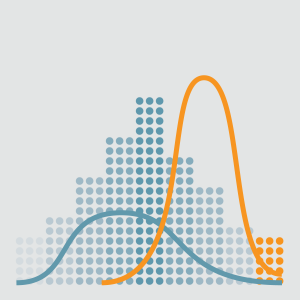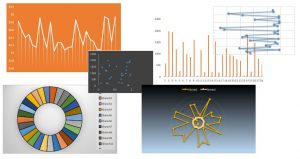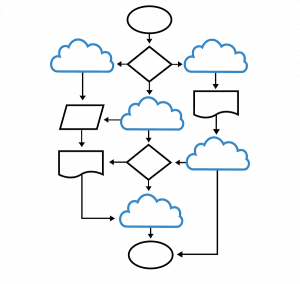Thesis Life: 7 ways to tackle statistics in your thesis
Thesis is an integral part of your Masters’ study in Wageningen University and Research. It is the most exciting, independent and technical part of the study. More often than not, most departments in WU expect students to complete a short term independent project or a part of big on-going project for their thesis assignment.
This assignment involves proposing a research question, tackling it with help of some observations or experiments, analyzing these observations or results and then stating them by drawing some conclusions.
Since it is an immitigable part of your thesis, you can neither run from statistics nor cry for help.
The penultimate part of this process involves analysis of results which is very crucial for coherence of your thesis assignment.This analysis usually involve use of statistical tools to help draw inferences. Most students who don’t pursue statistics in their curriculum are scared by this prospect. Since it is an immitigable part of your thesis, you can neither run from statistics nor cry for help. But in order to not get intimidated by statistics and its “greco-latin” language, there are a few ways in which you can make your journey through thesis life a pleasant experience.
-
Make statistics your friend
The best way to end your fear of statistics and all its paraphernalia is to befriend it. Try to learn all that you can about the techniques that you will be using, why they were invented, how they were invented and who did this deed. Personifying the story of statistical techniques makes them digestible and easy to use. Each new method in statistics comes with a unique story and loads of nerdy anecdotes.
-
If you cannot make friends with statistics, at least make a truce
If you cannot still bring yourself about to be interested in the life and times of statistics, the best way to not hate statistics is to make an agreement with yourself. You must realise that although important, this is only part of your thesis. The better part of your thesis is something you trained for and learned. So, don’t bother to fuss about statistics and make you all nervous. Do your job, enjoy thesis to the fullest and complete the statistical section as soon as possible. At the end, you would have forgotten all about your worries and fears of statistics.
-
Visualize your data
The best way to understand the results and observations from your study/ experiments, is to visualize your data. See different trends, patterns, or lack thereof to understand what you are supposed to do. Moreover, graphics and illustrations can be used directly in your report. These techniques will also help you decide on which statistical analyses you must perform to answer your research question. Blind decisions about statistics can often influence your study and make it very confusing or worse, make it completely wrong!
-
Simplify with flowcharts and planning
Similar to graphical visualizations, making flowcharts and planning various steps of your study can prove beneficial to make statistical decisions. Human brain can analyse pictorial information faster than literal information. So, it is always easier to understand your exact goal when you can make decisions based on flowchart or any logical flow-plans.
-
Find examples on internet
Although statistics is a giant maze of complicated terminologies, the internet holds the key to this particular maze. You can find tons of examples on the web. These may be similar to what you intend to do or be different applications of the similar tools that you wish to engage. Especially, in case of Statistical programming languages like R, SAS, Python, PERL, VBA, etc. there is a vast database of example codes, clarifications and direct training examples available on the internet. Various forums are also available for specialized statistical methodologies where different experts and students discuss the issues regarding their own projects.
-
Comparative studies
Much unlike blindly searching the internet for examples and taking word of advice from online faceless people, you can systematically learn which quantitative tests to perform by rigorously studying literature of relevant research. Since you came up with a certain problem to tackle in your field of study, chances are, someone else also came up with this issue or something quite similar. You can find solutions to many such problems by scouring the internet for research papers which address the issue. Nevertheless, you should be cautious. It is easy to get lost and disheartened when you find many heavy statistical studies with lots of maths and derivations with huge cryptic symbolical text.
-
When all else fails, talk to an expert
All the steps above are meant to help you independently tackle whatever hurdles you encounter over the course of your thesis. But, when you cannot tackle them yourself it is always prudent and most efficient to ask for help. Talking to students from your thesis ring who have done something similar is one way of help. Another is to make an appointment with your supervisor and take specific questions to him/ her. If that is not possible, you can contact some other teaching staff or researchers from your research group. Try not to waste their as well as you time by making a list of specific problems that you will like to discuss. I think most are happy to help in any way possible.
Talking to students from your thesis ring who have done something similar is one way of help.
Sometimes, with the help of your supervisor, you can make an appointment with someone from the “Biometris” which is the WU’s statistics department. These people are the real deal; chances are, these people can solve all your problems without any difficulty. Always remember, you are in the process of learning, nobody expects you to be an expert in everything. Ask for help when there seems to be no hope.
Apart from these seven ways to make your statistical journey pleasant, you should always engage in reading, watching, listening to stuff relevant to your thesis topic and talking about it to those who are interested. Most questions have solutions in the ether realm of communication. So, best of luck and break a leg!!!






A perfect approach in a very crisp and clear manner! The sequence suggested is absolutely perfect and will help the students very much. I particularly liked the idea of visualisation!
You are write! I get totally stuck with learning and understanding statistics for my Dissertation!
Statistics is a technical subject that requires extra effort. With the highlighted tips you already highlighted i expect it will offer the much needed help with statistics analysisin my course.
this is so much relevant to me! Don’t forget one more point: try to enrol specific online statistics course (in my case, I’m too late to join any statistic course). The hardest part for me actually to choose what type of statistical test to choose among many options